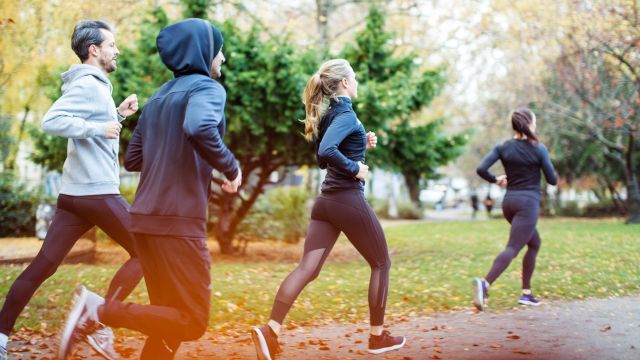Updated on June 29, 2023.
What if there was one activity you could do for two hours each week that helped you live three years longer? Good news: There just might be. Better news: You don’t need fancy machines or expensive personal trainers. All you need to do is run.
Regular running—even just a few minutes a day—will help make your RealAge younger than your calendar age, showing that your body has fewer miles on it than your actual age would suggest.
Pound the pavement, live longer
A growing body of research suggests that running leads to reduced chances of dying prematurely. For example, one meta-analysis of studies involving more than 230,000 people found that runners had a 27 percent lower risk of early death from any cause, compared to those who didn’t run. Published in 2022 in BMJ, the analysis also found that almost any amount of running helped, even if it was just once weekly, or for less than 50 minutes over the course of a week.
Another study, published in March 2017 in Progress in Cardiovascular Diseases, analyzed data from more than 55,000 people, as well as the results of other large studies. Researchers concluded that running may offer more longevity benefits than other types of physical activity.
In the study, people who only ran had a 30 percent lower risk of dying early than people who were wholly inactive. Those who were active but did not run had just a 12 percent reduced risk. People who ran and were active in other ways saw the biggest benefit—a 43 percent reduced risk of mortality. The authors concluded that runners could expect to live, on average, 3.2 years longer than non-runners.
The authors also mentioned it was unclear whether excessive amounts of running would be ineffective or unsafe—if too much could actually be detrimental to your health. In this study, however, there was no raised risk of mortality for people who ran the most.
Just minutes per day
Participants in the Progress in Cardiovascular Diseases study ran an average of two hours per week; experts recommend getting at least 75 of vigorous exercise or 150 minutes of moderate-intensity exercise weekly. The authors crunched the numbers and determined that one hour of running translates to about seven hours of longer life.
The March 2017 data was based on an older study, published in August 2014 in the Journal of the American College of Cardiology (JACC). The JACC study suggested that even 5 or 10 minutes of running per day at a slow pace significantly reduces the risk of dying early of any cause or dying of cardiovascular disease. Of course, runners generally tend to have healthier lifestyles; they don't usually smoke, for example. But even after researchers adjusted for these factors, runners still came out on top in terms of longevity.
Start a running routine
You don’t have to sign up for a marathon to get the benefits of a longer life. If you’re new to running, it’s best to start slowly to avoid injury.
- Invest in a good pair of running shoes. Local athletic stores or running shops can help fit you for the best pair.
- If you haven’t exercised in a while, start with a walk. A daily stroll can still help reduce your risk of high blood pressure, diabetes, and maybe even cardiovascular diseases. Any exercise is better than none, according to federal health officials. Even a quick two-minute bout of physical activity offers health benefits.
- If you’re ready to run, try intervals. Warm up with a five-minute walk. Then run for one minute and walk for two minutes. Repeat 10 times before cooling down with a walk. Changing your speed may help improve muscle strength and blood pressure.
- As you gain endurance, increase your running intervals beyond one minute by adding 30-second increments each week, while decreasing your rest. Before you know it, you’ll be running a mile without stopping.
Remember: It’s a good idea to speak with a healthcare provider before starting any new exercise regimen. Once you begin, keep tabs on your progress by using a tracking app. One option is Sharecare (available on iOS and Android), which has a built-in steps tracker. Try to go a little bit further and take a few more steps every run.







